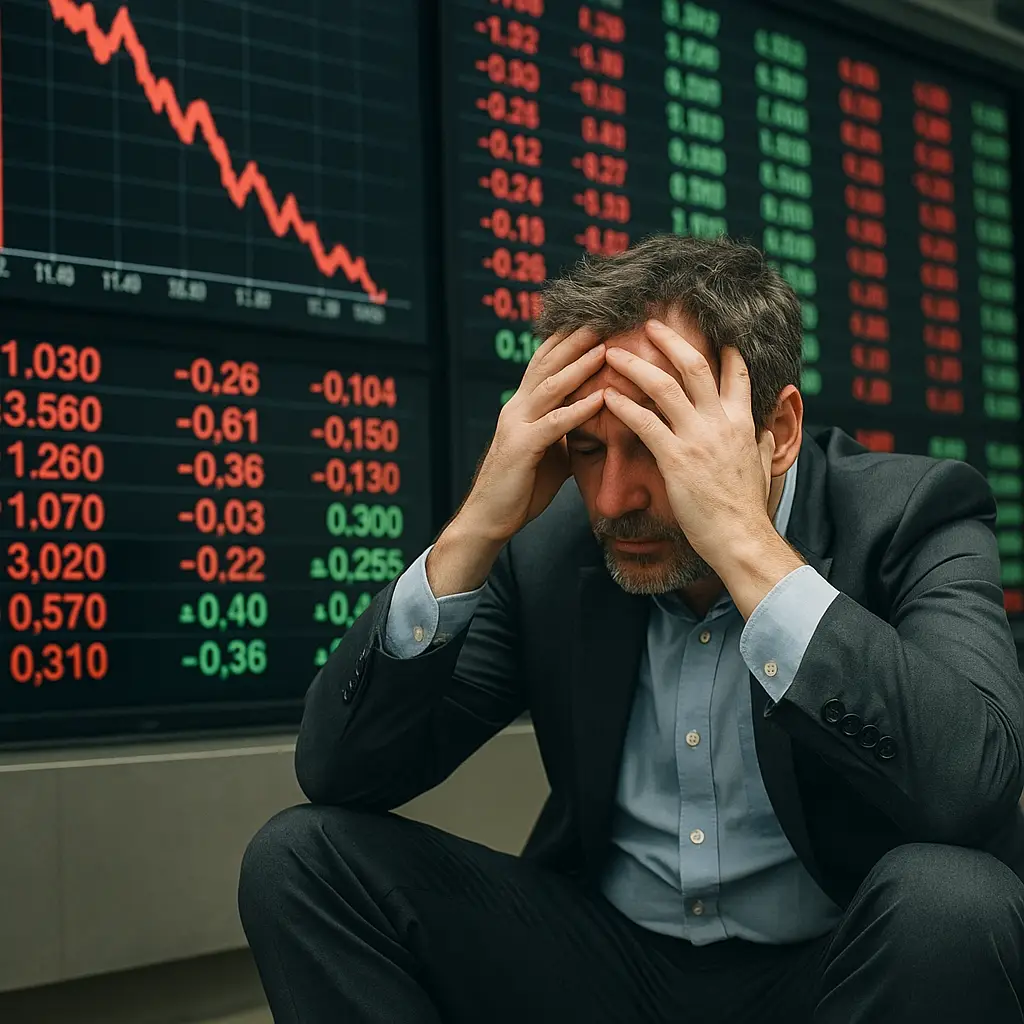Hey there, savvy investors! Welcome back to thegreateconomy.com, your go-to source for making sense of the financial world. I’m Bright T., and today, we’re tackling a question that’s been buzzing in every investor’s mind: Will the market crash? With headlines screaming about market crash today, whispers of a stock market collapse, and endless debates about stock market crash predictions, it’s easy to feel uneasy. Whether you’re hunting for stocks to buy this week or planning your stock market prediction for the next 5 years, this article is here to cut through the noise. Let’s dive into the factors driving the is the market crashing fears, what history tells us, and how you can protect your portfolio while spotting good buy stocks. Buckle up—this is going to be a comprehensive ride!
- Understanding the Fear: Is the Market Crashing?
- Why Are Investors Worried About a Stock Market Crash in 2025?
- What History Says About Stock Market Crashes
- Stock Market Crash Predictions for 2025: What Experts Say
- Strategies to Protect Your Portfolio
- Stocks to Buy This Week: Opportunities Amid Volatility
- Stock Market Prediction for the Next 5 Years
- Final Thoughts: Stay Calm and Invest Smart
Understanding the Fear: Is the Market Crashing?
The question “Is the market crashing?” isn’t new. Every time the Dow, S&P 500, or Nasdaq takes a dip, panic sets in. As of May 2025, recent volatility—sparked by trade tariffs, inflation concerns, and geopolitical tensions—has fueled market crash today headlines. For instance, the S&P 500 dropped nearly 7% in early April after President Trump’s tariff announcements, with the Nasdaq slipping into bear market territory. But here’s the thing: markets are emotional rollercoasters, and short-term drops don’t always mean a stock market collapse.
A market crash is defined as a sudden, significant decline in stock prices, often driven by panic selling and economic triggers like high valuations or policy shifts. Historically, crashes like the 1929 Great Depression or the 2008 financial crisis wiped out significant wealth but were followed by recoveries. The S&P 500, for example, has always bounced back, even after a 57% drop during the Great Recession. So, while stock market crash predictions grab attention, they’re often speculative. Let’s break down the key factors fueling these fears in 2025.

Why Are Investors Worried About a Stock Market Crash in 2025?
Several economic indicators and events are stoking fears of a stock market collapse. Here’s what’s driving the will the market crash conversation:
1. High Market Valuations
The S&P 500’s price-to-earnings (P/E) ratio is hovering around 30, close to an all-time high. The Buffett Indicator, which measures total U.S. stock market capitalization against GDP, is above 200%—a level Warren Buffett called “playing with fire” back in 2001. High valuations suggest stocks are overpriced, making them vulnerable to corrections. For example, tech giants like Nvidia saw sharp declines in early 2025, raising concerns about a broader market crash today.
2. Tariff and Trade War Tensions
President Trump’s April 2025 tariff announcements, including a 10% minimum tariff on most imports, sent shockwaves through global markets. The S&P 500, Nasdaq, and Dow lost 3.5%–5% in a single day, and international indices like the FTSE 100 and Nikkei 225 saw significant drops. These tariffs could increase inflation, squeeze consumer spending, and push the U.S. toward a recession, fueling stock market crash predictions.
3. Rising Inflation and Interest Rates
Inflation remains stubborn, and the Federal Reserve’s reluctance to cut rates aggressively is adding pressure. As of March 2025, the yield curve (10-year vs. three-month Treasury) is nearly inverted, a historical recession signal. High interest rates raise borrowing costs, impacting corporate profits and stock valuations. If the Fed raises rates in 2025, as some analysts predict, a stock market collapse could become more likely.
4. Consumer Debt and Economic Slowdown
Consumer debt is climbing, with credit card, auto, and mortgage debt hitting record highs. With 20% of Americans struggling to pay credit card balances, consumer spending—a key economic driver—could falter. A forecasted 2.2% GDP contraction in Q1 2025 mirrors levels seen before the 2008 and 2020 recessions, raising red flags.
5. Geopolitical and Policy Uncertainty
From ongoing conflicts in the Middle East and Europe to uncertainty around Trump’s policies, global instability is weighing on markets. Posts on X reflect this unease, with some users predicting a “global bust” due to debt and leverage. While these sentiments aren’t definitive, they highlight the fear driving is the market crashing searches.
Despite these concerns, some experts remain optimistic. Goldman Sachs projects a 5–7% S&P 500 rise in 2025, driven by 10% earnings growth, suggesting resilience. So, is a crash inevitable, or are we just in a volatile phase? Let’s look at historical patterns.
What History Says About Stock Market Crashes
History offers valuable lessons for predicting whether the market will crash. Over the past 150 years, the S&P 500 has faced 10 major crashes (20%+ drops), roughly one every decade. Here are a few notable examples:
- 1929 Crash and Great Depression: A 79% drop took four years to recover, driven by overconfidence and unsustainable valuations.
- 1987 Black Monday: The Dow fell 22.6% in a single day due to program trading and overvaluation, but recovered in two years.
- 2008 Financial Crisis: A 57% S&P 500 drop was triggered by subprime loans and bank failures, with recovery by 2012.
- 2020 COVID Crash: A 34% drop was sharp but short, with a four-month recovery due to stimulus.
The key takeaway? Markets recover. The stock market prediction for the next 5 years is uncertain, but historical data suggests that even severe crashes don’t spell doom for long-term investors. The S&P 500’s average bear market lasts 286 days, and recoveries often bring new highs.
Stock Market Crash Predictions for 2025: What Experts Say
Expert opinions on a 2025 stock market collapse are mixed. Here’s a snapshot:
- Bearish Views:
- Robert Kiyosaki predicts a crash bigger than 1929, citing an “everything bubble.”
- Jeremy Grantham warns of a “cataclysmic decline” due to overvaluation and global challenges.
- David Kotok of Cumberland Advisors sees the S&P 500 potentially dropping to 4,000, an 8%+ decline from current levels.
- John Hussman’s recession gauge signaled a downturn risk in April 2025, tied to tariffs and economic weakness.
- Bullish Views:
- Goldman Sachs forecasts a 7–8% S&P 500 return in 2025, driven by AI-driven earnings growth.
- Warren Buffett avoids crash predictions, emphasizing preparation over timing. His $325 billion cash stockpile suggests caution, but he’s not calling for a crash.
- Neutral Views:
- David Keller of Sierra Alpha Research sees the S&P 500 finding support at 4,850 but warns of bearish trends unless it reclaims the 200-day moving average.
- The Motley Fool advises against selling, noting that timing the market often leads to missed gains.
X posts reflect similar division, with some users predicting a decades-long bear market and others seeing short-term volatility. The truth? No one can predict the exact timing of a crash. As Buffett says, “Short-term market forecasts are poison.”
Strategies to Protect Your Portfolio
Whether or not a market crash today is imminent, preparation is key. Here’s how to safeguard your investments and find good buy stocks:
1. Diversify Your Portfolio
A diversified portfolio across asset classes, sectors, and geographies reduces risk. Consider:
- Bonds: Corporate bonds offer stability and steady income.
- Gold: A hedge against volatility, with ETFs like VanEck Gold Miners (GDX) providing exposure.
- Defensive Stocks: Consumer staples and utilities, which held up in 2025’s downturn, are less sensitive to economic swings.
2. Focus on Long-Term Investing
History shows that staying invested through crashes pays off. Investors who sold during the 2008 crisis missed the recovery. Use dollar-cost averaging to buy more shares when prices dip, especially for stocks to buy this week with strong fundamentals.
3. Avoid Market Timing
Trying to predict will the market crash and sell before a drop often backfires. A 2023 Wealthfront study found that staying invested for 15+ years reduces the chance of losses to 0.3%. As Peter Lynch noted, “Far more money has been lost by investors trying to anticipate corrections than in corrections themselves.”
4. Seek High-Quality Stocks
Look for good buy stocks with:
- Strong Fundamentals: Low debt, consistent earnings, and competitive advantages.
- AI and Tech Exposure: Despite volatility, AI stocks like Microsoft or Amazon could thrive long-term due to productivity gains.
- Value Stocks: High-beta, low-risk value stocks may outperform during corrections.
5. Consult a Financial Advisor
A fiduciary advisor can tailor a strategy to your risk tolerance and goals, helping you navigate stock market crash predictions.
Stocks to Buy This Week: Opportunities Amid Volatility
Despite is the market crashing fears, downturns create buying opportunities. Here are sectors and strategies to consider for stocks to buy this week:
- Consumer Staples: Companies like Procter & Gamble or Walmart are resilient in recessions.
- Utilities: Stable dividends make utilities like NextEra Energy attractive.
- AI and Tech: Hyperscalers like Amazon and Microsoft, investing heavily in AI infrastructure, could lead the stock market prediction for the next 5 years.
- Energy and Financials: Deregulation under Trump may boost these sectors.
Always research fundamentals before buying. For example, check a company’s debt-to-equity ratio and earnings growth to ensure it’s a good buy stock.
Stock Market Prediction for the Next 5 Years
Predicting the stock market prediction for the next 5 years is tricky, but trends suggest:
- AI Growth: Continued investment in AI could drive tech sector gains, with companies like Meta and Google leading.
- Economic Cycles: If tariffs trigger a recession, recovery could take 2–3 years, but markets historically rebound.
- Global Factors: Trade policies and geopolitical tensions will shape returns, but diversification mitigates risks.
Buffett’s advice rings true: “Time in the market beats timing the market.” Focus on quality investments and a long-term horizon.
Final Thoughts: Stay Calm and Invest Smart
So, will the market crash in 2025? No one knows for sure. While high valuations, tariffs, and inflation raise red flags, the U.S. economy’s resilience and historical recoveries offer hope. At thegreateconomy.com, we’re here to help you navigate these uncertainties. As Bright T., I encourage you to avoid panic, diversify your portfolio, and seize opportunities in stocks to buy this week. Whether you’re eyeing good buy stocks or planning for the stock market prediction for the next 5 years, a disciplined approach will serve you well.
Have thoughts on the market crash today or want to share your favorite good buy stocks? Drop a comment below, and let’s keep the conversation going! Stay tuned to thegreateconomy.com for more insights to grow your wealth wisely.





